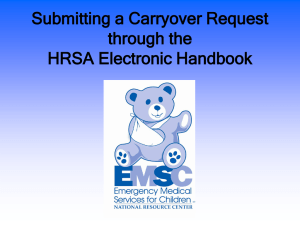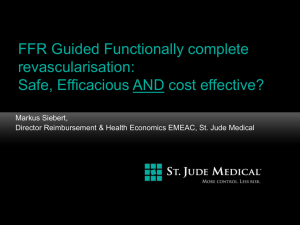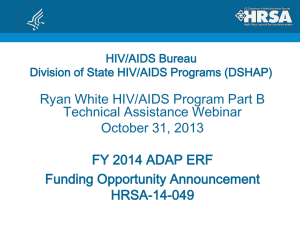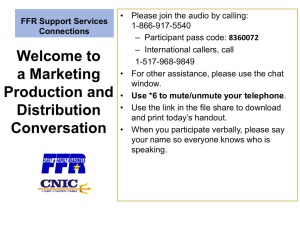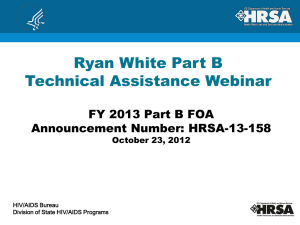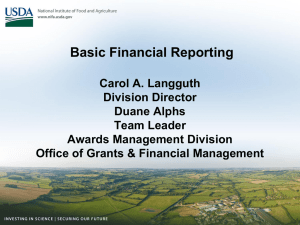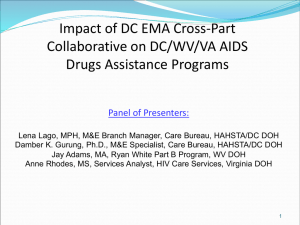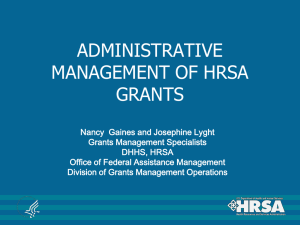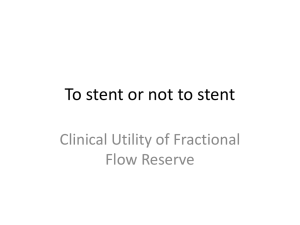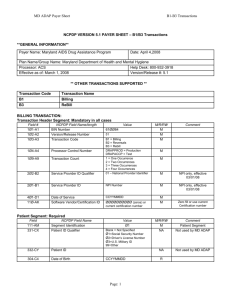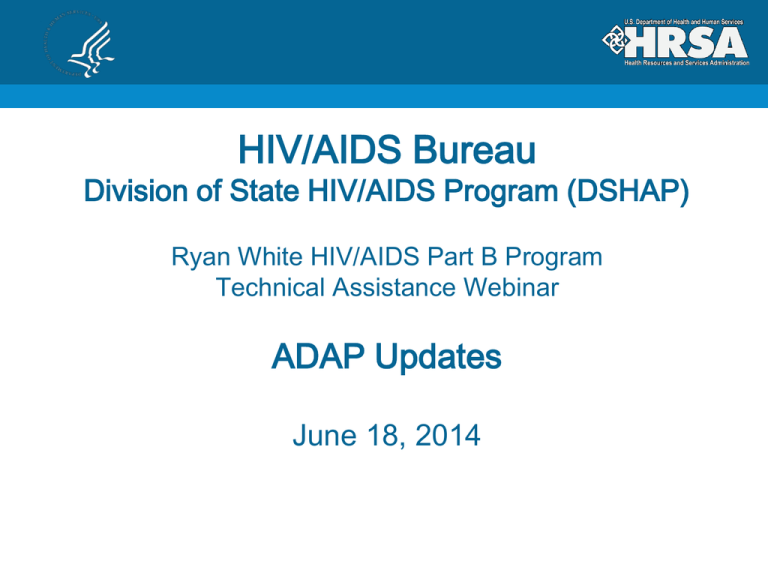
HIV/AIDS Bureau
Division of State HIV/AIDS Program (DSHAP)
Ryan White HIV/AIDS Part B Program
Technical Assistance Webinar
ADAP Updates
June 18, 2014
DSHAP Mission: To provide leadership
and support to States/Territories for
developing and ensuring access to
quality HIV prevention, health care, and
support services.
DSHAP Vision: Optimal HIV/AIDS
Prevention, Care and Treatment for all.
Agenda
Opening Remarks/Announcements
Heather Hauck
ADR Update
Glenn Clark
Policy Clarification Notices Updates
CMS Final Rule
Glenn Clark/
Yolonda Campbell
Glenn Clark/
Heather Hauck
Yolonda Campbell
Closing Remarks
Heather Hauck
ACA-related Questions from ADAPs
Objectives
• To review Policy Clarification Notice 14-01, and updates
to PCNs 13-05 and 13-06
• To provide an update on key issues related to ADAP,
especially regarding implementation of the ACA
• To provide a brief overview of CMS Final Rule for
Exchange/Insurance Market Standards for 2015 and
Beyond and how it may impact RWHAP grantees
Announcements &
Updates
Announcements
Announcements
• New Ryan White Services Tracker Tool
• CAREWare Survey
Upcoming Webinars
• ADR Town Hall: June 25
• Access to HIV Testing and Linkage to Care: June 26
• Ryan White Services Tracker: June 27
For more information, check the TARGET Center
ADR
• Thanks for all the hard work that went into the CY
2013 ADR Submission
• 41 States/Territories were able to submit on time
• Data contractors are working with the remaining
States/Territories to successfully submit ASAP
• CY 2014 ADR
• The data dictionary and ADR manual are scheduled to
be released on 8/1/14
• The Division of Policy and Data (DPD) will be offering
training webinars for the RSR and ADR in Fall 2014.
Updates on Policy Clarification
Notices 13-05, 13-06 & 14-01
Yolonda Campbell
Health Policy Analyst
Office of Planning, Analysis and Evaluation
Glenn Clark
ADAP Advisor
Division of State HIV/AIDS Program
FFR Briefing for DSHAP
Update on PCNs
New Policy Clarification Notice (PCN) 14-01 on
reconciliation of advance premium tax credits
• On June 6th, HRSA released PCN 14-01, which clarifies
HRSA policy regarding the use of Ryan White HIV/AIDS
Program funds to purchase health insurance for clients in
the Marketplace and the reconciliation of advance
premium tax credits.
• RWHAP grantees and sub-grantees must vigorously
pursue any excess premium tax credit a client receives
from the IRS upon submission of the client’s tax return.
• Collect excess premium tax credit attributed to individual client
FFR Overview
Update on PCNs
PCN 14-01 continued
• HRSA is considering allowing RWHAP grantees and
sub-grantees to use RWHAP funds to pay the IRS any
additional income tax liability a client may owe to the
IRS solely based on reconciliation of the premium tax
credit.
• HRSA will be seeking comments from the public
regarding this proposed policy in a forthcoming
Federal Register Notice.
FFR Overview
Update on PCNs
Revised Policy Clarification Notice (PCN) 13-05
on formulary equivalency
• On June 6th, HRSA released a revised PCN 13-05 that
changes the formulary requirement be that it, at a
minimum, includes at least one drug in each class of core
antiretroviral therapeutics from the HHS Clinical
Guidelines for the Treatment of HIV/AIDS as well as
appropriate primary care services.
• Please note that the ADAP still needs to do a cost
effectiveness analysis.
FFR Overview
Update on PCNs
Revised Policy Clarification Notice (PCN) 13-06
on formulary equivalency
• Revised PCN 13-06 that clarifies that when RWHAP Part
A planning bodies, Part B, Part C and Part D grantees
provide funding for Medicaid premium and cost-sharing
assistance for low-income individuals, the grantee must
also assure that they are buying health insurance that, at a
minimum, includes at least one drug in each class of core
antiretroviral therapeutics
FFR Overview
Question and Answer Session
ACA Implementation-related
Questions from ADAPs
Glenn Clark
and
Heather Hauck
Director
Division of State HIV/AIDS Program
FFR Briefing for DSHAP
ADAP Clarifications
Question:
• While HRSA has clarified that an ADAP cannot pay for a
combination drug when the components of the drug are
covered by a client’s insurance but the combo drug is not,
can ADAPs override this restriction if the physician writes
a Dispense as Written (DAW) order for the combo
medication?
Answer:
• No, the Dispense As Written does not override payer of
last resort. The cost cannot be covered by the ADAP
using RWHAP Funds.
FFR Overview
ADAP Clarifications
Question:
• If an ADAP is paying for the premium for a client’s
insurance, can the ADAP pay for a drug that is not
covered on that insurance’s formulary?
Answer:
• Yes, if that drug is on the ADAP’s Formulary.
FFR Overview
ADAP Clarifications
Question:
• With marijuana having been legalized in a few states, can
ADAP be used to pay for medical marijuana? How about
for marinol?
Answer:
• ADAP can only be used to pay for FDA approved
medications. Marinol is FDA approved and can be
covered by ADAP, but medical marijuana is not FDA
approved, and cannot be covered.
FFR Overview
ADAP Clarifications
Question:
• Will HRSA be providing further guidance on “vigorously
pursue” and thoroughly document?
Answer:
• HRSA is working on identifying best practices for
“vigorously pursue”.
Grantees and sub-grantees should refer to the relevant
Policy Clarification Notices and the National Monitoring
Standards for existing guidance.
FFR Overview
ADAP Clarifications
Question:
• Can ADAPs dis-enroll a client for non-compliance with
enrolling in Medicaid or a QHP?
Answer:
• No. HRSA’s PCN 13-04 states that a client may continue
to receive services through the RWHAP if the client
remains unenrolled in health care coverage after extensive
documented efforts on the part of the grantee. Our goal
as a public health program is to ensure and enable
coverage for all eligible PLWH.
FFR Overview
Question and Answer Session
CMS Final Rule for
Exchange/Insurance Market
Standards for 2015 and Beyond
Yolonda Campbell
Health Policy Analyst
Office of Planning, Analysis and Evaluation
FFR Briefing for DSHAP
CMS Final Rule
Final Rule for Exchange/Insurance Market
Standards for 2015 and Beyond
• On May 16, the Department of Health and Human
Services (DHHS), Centers for Medicaid & Medicare
Services (CMS), issued the final rule for
Exchange/Insurance Market Standards for 2015 and
Beyond. The rule promotes affordability, transparency
and takes the first step toward providing additional quality
related tools for consumers shopping in the Health
Insurance Marketplace.
FFR Overview
CMS Final Rule
This rule will help to improve consumer protections, keep
premiums affordable, and make additional information
available to consumers in the future, such as quality ratings
that will help them to better compare and choose
plans. Specifically, the rule finalizes policies to:
• Strengthen the prescription drugs exceptions process, so
consumers with an urgent medical issue have quicker
access to needed drugs that aren’t already covered by
their plan
• Require health insurance issuers to provide standardized
notices to their enrollees when issuers decide to
discontinue or renew coverage
FFR Overview
CMS Final Rule
The rule finalizes policies to (continued):
• Collect information from issuers to generate quality rating
scores for plans on the Marketplace beginning in 2016
• Provide flexibility to states to ensure Small Business
Health Options Program (SHOP) works in the best interest
of consumers in 2015
• Strengthen standards for Navigators and other consumer
assisters
• Improve premium stabilization policies for 2015
FFR Overview
Highlight: Consumer Assistance
• “…in specific circumstances, certified application counselor (CAC)
designated organizations can serve target populations without
violating the broad non-discrimination requirement related to
Exchange functions”
• RWHAP providers may offer CAC services exclusively to their
client populations (e.g. enrollment assistance, post-enrollment
assistance, outreach and education about getting covered), so long
as they do not discriminate based on race, color, national origin,
disability, age sex or other prohibited factors
CMS Final Rule
Highlight: 24 hour expedited review
of formulary requests
• Qualified Health Plans (QHPs) must have an expedited exceptions
process for beneficiaries with exigent circumstances to seek a
medication not covered under a plan
• Exigent circumstances exist when an enrollee is suffering from a health
condition that may seriously jeopardize the enrollee's life, health, or ability
to regain maximum function or when an enrollee is undergoing a current
course of treatment using a non-formulary drug
• QHPs must decide within 24 hours of receiving the request
• QHPs must provide coverage of any drug obtained through this
expedited exceptions process for the duration of the exigency
FFR Overview
Question and Answer Session
Coordination with State-Based
Marketplaces
DSHAP would like to hear from States with Statebased marketplaces as to successes/best practices
or challenges in working with your marketplace.
If you would like to share your experiences, please
contact your Project Officer or Glenn Clark.
FFR Overview
Contact Information
Glenn Clark
ADAP Advisor, DSHAP
Phone: (301) 443-3692
E-mail:GLClark@hrsa.gov
Thank You

